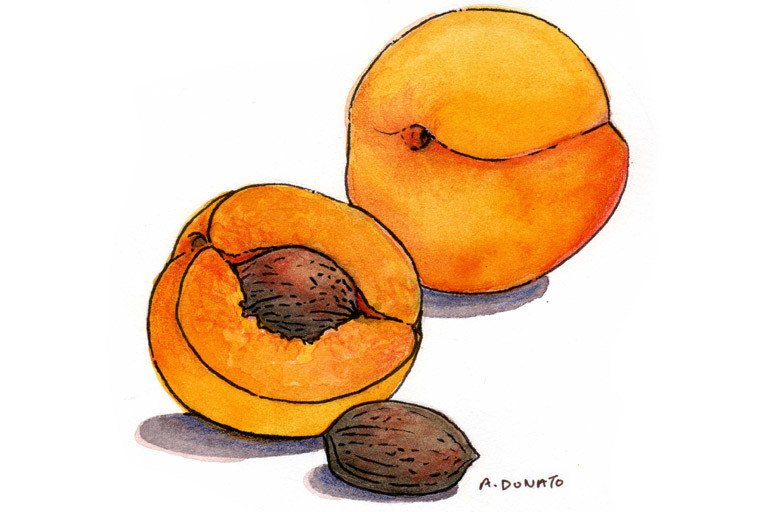
Common Names
- Apricot pits
- Vitamin B17
- Mandelonitrile-beta-glucuronide (semi-synthetic)
- Mandelonitrile beta-D-gentiobioside (natural product)
- Laevorotatory and mandelonitrile
- Prunasin
For Patients & Caregivers
Tell your healthcare providers about any dietary supplements you’re taking, such as herbs, vitamins, minerals, and natural or home remedies. This will help them manage your care and keep you safe.
Amygdalin (Laetrile) has not been shown to treat or prevent cancer. It is associated with serious adverse effects.
Amygdalin (also called Laetrile®) is an extract derived from apricot pits and other plants. It can be broken down by enzymes in the intestine to produce cyanide, a known poison. It was first used in Europe and later in the United States as an alternative cancer therapy. Promoters claimed that the cyanide released from amygdalin selectively killed cancer cells, leaving normal tissue cells unharmed. When fed to laboratory animals that had cancer cells implanted in them, amygdalin did not reduce the tumor size or slow their growth. In a clinical study, cancer patients using amygdalin did not have any benefits, but some showed cyanide toxicity.
There is renewed interest in studying amygdalin after the discovery of new anticancer mechanisms. However, cancer patients should not use this product in the current form until more is known about its safety and effectiveness.
- To prevent and treat cancer
Although laboratory experiments suggest anticancer properties, clinical evidence does not support this use. Amygdalin (Laetrile®) has been linked to several cases of cyanide poisoning in cancer patients.
- Inflammation and redness of the skin.
- Cyanide toxicity from high doses or prolonged use causing nausea, vomiting, headaches, dizziness, mental confusion, bluish skin discoloration, inadequate oxygen supply to tissues, low blood pressure, drooping eyelids, nerve dysfunction, coma, and death.
Patient Warnings:
- Cyanide poisoning has occurred with the intake of amygdalin or apricot kernels.
- Contaminated/adulterated products have been found in both injectable and oral forms.
Special Point:
- The Food and Drug Administration has banned the sale and use of amygdalin (Laetrile®) due to the risk of cyanide poisoning. For this reason, Laetrile® is only offered at alternative medicine clinics outside the United States. Some clinics use it as a component of multi-modality metabolic therapies, but these therapies generally have not been found effective.
For Healthcare Professionals
Amygdalin is a naturally occurring cyanogenic glycoside derived from nuts, plants, and the pits of certain fruits, primarily apricots. Bitter almonds containing amygdalin are used in Traditional Chinese Medicine to remove “blood stasis” and to treat abscesses (1). Amygdalin was first used to treat cancer more than a century ago in Russia and later in the United States. A purified form sold as Laetrile has been a popular alternative cancer therapy since the 1960s. Some claimed amygdalin to be a vitamin (B17) and that deficiencies could cause cancer, but this is not substantiated by scientific evidence (2). Amygdalin is banned in the United States, but it is available in other countries and online.
Amygdalin is metabolized by the enzyme beta-glucosidase into benzaldehyde, glucose and cyanide in the intestine (3) (4). Cyanide is believed to be cytotoxic with actions selective against cancerous cells, but results from animal studies were mostly negative (4) (5) (6). Other preclinical data suggest that amygdalin has hepatoprotective effects (39); may help relieve pain due to anti-inflammatory and analgesic properties (7) (8); and exerts protective effects in chronic obstructive pulmonary disease (35). Amygdalin also inhibited tumor growth, but further studies are needed to confirm this finding (9).
A clinical trial in the late 1970s supported by the National Cancer Institute did not find amygdalin beneficial, and some patients in the study developed cyanide toxicity (10). A systematic review also concluded that amygdalin is ineffective against cancer (11).
With the recent discovery of anticancer properties of amygdalin through previously unknown mechanisms (12) (13) (14) (15) (16) (32) (36) (37), there is renewed interest in whether this agent may have potential as an anticancer treatment. However, amygdalin is not approved for use in the United States.
- Cancer
Amygdalin is metabolized by the enzyme beta-glucosidase, which removes the glucose molecules to form prunasin and mandelonitrile. This is further broken down to benzaldehyde and hydrocyanic acid (3) (4). When consumed orally, amygdalin is more likely to produce cyanide toxicity, compared with the injectable form (17), possibly due to the presence of enzymes from the microflora in the intestine (18). Cyanide from the hydrolysis of amygdalin is cytotoxic. It was postulated that this action is selective against cancerous cells because normal cells convert the cyanide to benign thiocyanate via rhodanese (19) (20) (21). This theory has not been proven in humans (22).
Amygdalin demonstrated anti-inflammatory effects by promoting immunomodulation of Treg cells (24). In animal studies, amygdalin suppressed prostaglandin E(2) synthesis and NO production through COX-2 and iNOS inhibition (7). It also reduced inflammation pain by inhibiting TNF-alpha and IL-1beta (8), and exerts neurotrophic effects by activating the extracellular-signal-regulated kinase (ERK) 1/2 pathway (25).
Recent studies found amygdalin may have anticancer effects. In animal models, amygdalin inhibits the tumor-promoting effect of the Epstein-Barr virus (12). In human prostate cancer cells, it increased pro-apoptotic Bax protein expression and caspase-3 enzyme activity, while decreasing anti-apoptotic Bcl-2 protein expression (23). It also downregulates cell cycle-related genes in human colon cancer cells (13). Amygdalin may inhibit growth and proliferation in bladder cancer cell lines by decreasing cell cycle regulatory proteins cdk2 and cyclin A (16). It also induces growth-regulating protein follistatin expression in human hepatocarcinoma cells (15).
Case reports
Dermatitis and cyanide toxicity: Including nausea, vomiting, headache, dizziness, altered alertness, cyanosis, hypotension, eyelid droop, neuropathies, coma, and death (10) (17) (29) (27) (30) with oral intake.
Cyanide poisonings: Following ingestion of amygdalin with concurrent high-dose vitamin C (26) or apricot kernels (38) (40) and with intravenous/oral administration (33).
Peripheral neuropathy: Following consumption of amygdalin by a patient with vitamin B12 deficiency (31).
Hypoxia: From cyanide toxicity after consumption of apricot kernel extract (34).